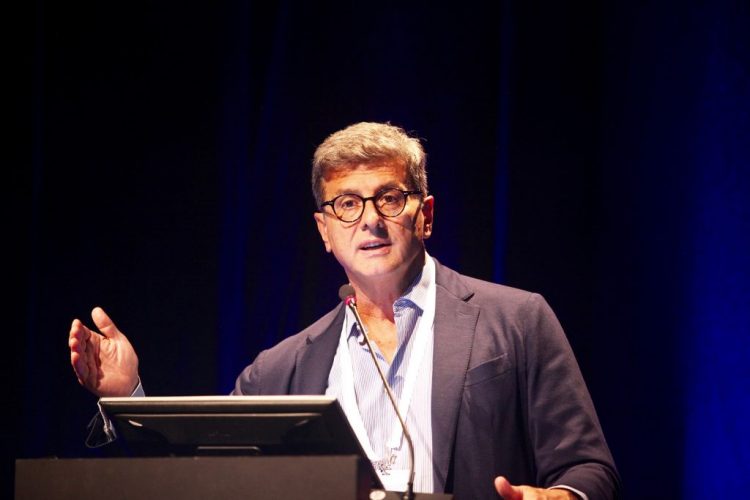Cataract surgery and anaridia
Performing surgery in eyes with aniridia presents many challenges.

Roibeard O’hEineachain
Published: Friday, November 1, 2019
 Professor Paolo Nucci MD
Good outcomes are difficult to achieve when performing cataract surgery in eyes with aniridia, Professor Paolo Nucci MD reminded attendees at a World Society of Paediatric Ophthalmology and Strabismus (WSPOS) sub-specialty day in Paris, France.
He noted that cataracts typically develop in aniridia patients at an age when the requirement for good vision is at its greatest, around the age people are learning to drive and going to university. At that age, the pressure to have good vision is at its greatest and patients and their parents put some pressure on their physicians for a surgical treatment that will ameliorate their condition.
However, only a minority of cases will benefit from such procedures, said Prof Nucci, University Ophthalmology Clinic, of San Giuseppe Hospital, Milan, Italy.
Unbelievable (mis)treatments
“I have seen things you people would not believe. I have seen congenital aniridia patients treated with LASIK, I have seen patients implanted with lenses with no regard for the weakness of the zonules I have seen patients implanted with multifocal lenses, and I’ve seen patients treated with trabeculectomy and mitomycin-C with disastrous results.” he added.
Prof Nucci stressed that both conventional ultrasound phacoemulsification and femtosecond laser-associated cataract surgery (FLACS) are highly problematic in aniridia patients due to corneal opacity and weak zonules. In addition, the irregularity of the cornea makes it difficult to achieve a perfect capsulorhexis with a femtosecond laser. However, using a femtosecond laser can help preserve limbal stem cells.
He added that capsular tension rings are often not useful in eyes with aniridia because the zonular weakness in eyes with the condition extends the entire perimeter of the capsular bag. Multifocal IOLs are strongly contraindicated because of the possibility of decentration. In paediatric patients below the age of 12, the myopic shift should be taken into account.
Iris prostheses
Prof Nucci noted that some have proposed the use of iris prostheses for congenital aniridia. However, there is as yet no published research showing any benefit of the devices in such patients. The prostheses require a large incision and their implantation is traumatic to the intraocular structures and also can also induce glaucoma. The use of the devices in congenital cases is market-driven rather than evidence based, he said.
“The majority of studies proposing treatment for traumatic aniridia and only anecdotally with congenital aniridia. Every device we use means more complications, so keep in mind that less is sometimes more,” he concluded.
Paolo Nucci: Paolo.nucci@unimi.it
Professor Paolo Nucci MD
Good outcomes are difficult to achieve when performing cataract surgery in eyes with aniridia, Professor Paolo Nucci MD reminded attendees at a World Society of Paediatric Ophthalmology and Strabismus (WSPOS) sub-specialty day in Paris, France.
He noted that cataracts typically develop in aniridia patients at an age when the requirement for good vision is at its greatest, around the age people are learning to drive and going to university. At that age, the pressure to have good vision is at its greatest and patients and their parents put some pressure on their physicians for a surgical treatment that will ameliorate their condition.
However, only a minority of cases will benefit from such procedures, said Prof Nucci, University Ophthalmology Clinic, of San Giuseppe Hospital, Milan, Italy.
Unbelievable (mis)treatments
“I have seen things you people would not believe. I have seen congenital aniridia patients treated with LASIK, I have seen patients implanted with lenses with no regard for the weakness of the zonules I have seen patients implanted with multifocal lenses, and I’ve seen patients treated with trabeculectomy and mitomycin-C with disastrous results.” he added.
Prof Nucci stressed that both conventional ultrasound phacoemulsification and femtosecond laser-associated cataract surgery (FLACS) are highly problematic in aniridia patients due to corneal opacity and weak zonules. In addition, the irregularity of the cornea makes it difficult to achieve a perfect capsulorhexis with a femtosecond laser. However, using a femtosecond laser can help preserve limbal stem cells.
He added that capsular tension rings are often not useful in eyes with aniridia because the zonular weakness in eyes with the condition extends the entire perimeter of the capsular bag. Multifocal IOLs are strongly contraindicated because of the possibility of decentration. In paediatric patients below the age of 12, the myopic shift should be taken into account.
Iris prostheses
Prof Nucci noted that some have proposed the use of iris prostheses for congenital aniridia. However, there is as yet no published research showing any benefit of the devices in such patients. The prostheses require a large incision and their implantation is traumatic to the intraocular structures and also can also induce glaucoma. The use of the devices in congenital cases is market-driven rather than evidence based, he said.
“The majority of studies proposing treatment for traumatic aniridia and only anecdotally with congenital aniridia. Every device we use means more complications, so keep in mind that less is sometimes more,” he concluded.
Paolo Nucci: Paolo.nucci@unimi.it